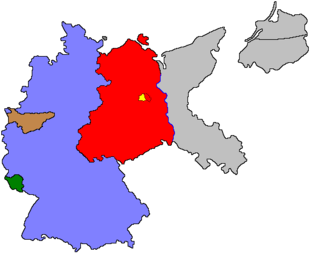Planul Morgenthau
From Wikipedia, the free encyclopedia
Planul Morgenthau a fost un plan de împărțire a Germaniei după cel de-Al Doilea Război Mondial care impunea măsuri dure cu intenția de a înlătura posibilitatea Germaniei de a mai declanșa un război. Planul a fost propus de Henry Morgenthau, secretar al Trezoreriei SUA. Propunerea inițială trebuia atinsă în trei pași importanți:
- Germania urma să fie împărțită în două state independente.
- Centrele principale de minerit și industrie ale Germaniei, incluzând regiunile Saar și Ruhr și Silezia de Sus urmau să fie internaționalizate și anexate țărilor vecine.
- Toată industria grea urma să fie demontată sau distrusă în alt mod.


La a doua conferință din Quebec din 16 septembrie 1944 președintele SUA, Franklin D. Roosevelt și Henry Morgenthau l-au convins pe prim-ministrul britanic Winston Churchill să fie de acord cu planul.[1] Cu toate acestea, Churchill a întocmit o nouă versiune a planului, îngustând scopurile planului inițial și care a fost în final acceptată și semnată și de președintele Roosevelt. [1]
Vezi și
- Societatea pentru Prevenirea celui de-al Treilea Război Mondial
- Planuri industriale pentru Germania
- Istoria Germaniei postbelice
- Planul Marshall
- Planul Monnet, între 1945–1947 de reconstrucție a Franței ce presupunea ca Franța să primească control asupra zonelor cu resursele de cărbune și oțel ale Germaniei în regiunea Ruhr și Saar.
- Planul Bakker-Schut
- Wirtschaftswunder ("Miracolul economic," the seemingly 'miraculous' economic recovery of post-World War II West Germany)
- James Bacque
- Reparații germane pentru cel de-al Doilea Război Mondial
Note
Bibliografie
De citit
Legături externe
Wikiwand - on
Seamless Wikipedia browsing. On steroids.
